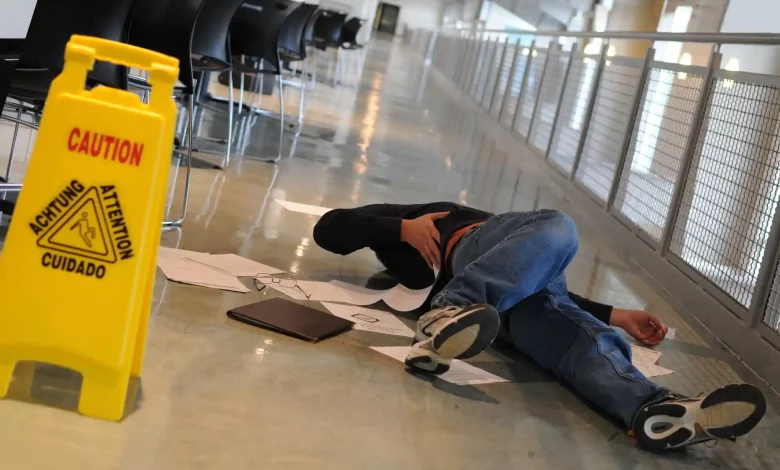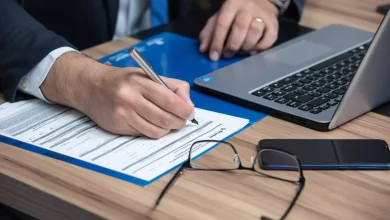How to File Slip and Fall Claims: Everything You Need to Know

Accidents happen, and one of the most common types is slip and fall accidents.
Whether it’s a wet floor, uneven surfaces, or poor lighting, these accidents can lead to injuries and disruptions in our lives. If you’ve been involved in a slip and fall accident due to someone else’s negligence, it’s important to understand the process of filing a claim. This comprehensive guide provides the knowledge needed to navigate the claim process successfully.
Read on to learn more about file slip and fall claims.
Understanding Slip and Fall Accidents
First, let’s discuss what constitutes a slip and fall accident. It occurs when an individual loses their footing and falls on someone else’s property. The causes can range from slippery surfaces to obstacles in the walking path.
These accidents can result in sprains, fractures, or even head trauma. Understanding the circumstances surrounding your slip and fall accident is essential in building a strong case.
Assessing Your Eligibility
Determining your eligibility for a slip and fall claim is a crucial step. You must prove that the property owner or occupier was negligent in establishing liability. This is in maintaining a safe environment.
Negligence means they fail to exercise reasonable care. You may be entitled to compensation if you believe the accident occurred due to their negligence. In complex cases, it’s advisable to seek the guidance of a personal injury lawyer specializing in slip and fall claims.
Gathering Essential Claim Documents
Having the right documentation to support your slip and fall case is important when filing. If a slip and fall accident occurs on someone else’s property, filing an incident report is crucial. This document provides an official record of the incident.
Collect all medical documents related to your slip and fall injuries. This includes doctor’s reports, hospital bills, X-rays, and other relevant diagnostic tests. These records will demonstrate the extent of your injuries and the resulting medical expenses.
Ensure you take clear and detailed photographs of the accident scene. This includes the hazardous conditions that caused your fall. Pictures can provide visual evidence and help establish liability.
Get their statements if there were witnesses to your slip and fall accident. Their testimonies can support your claim by corroborating the circumstances surrounding the incident. Lastly, check if the accident occurred in a facility equipped with security cameras.
You may request any available surveillance footage. This evidence can be crucial in proving negligence.
Understanding the Claim Filing Process
Now that you have the necessary documentation, it’s time to familiarize yourself with the claim filing process. First, you must consult a personal injury lawyer. Engage in the services of a personal injury lawyer who specializes in slip and fall cases.
This can greatly enhance your chances of a successful claim. They have the expertise to navigate the legal complexities. They can negotiate with insurance companies.
The second is to be aware of the claim filing deadline set by your jurisdiction. Please complete this deadline to avoid dismissal of your claim. Your lawyer can ensure your claim is filed within the required timeframe.
Your personal injury lawyer will guide you through the process. This includes detailing the circumstances of the slip and fall accident. It also consists of injuries sustained and the damage you seek.
Next, your lawyer will initiate negotiations with the responsible party’s insurance company. Their goal is to secure a fair settlement. This covers your medical expenses, lost wages, pain and suffering, and other applicable damages.
And last, if necessary, is the trial. In some cases, a settlement cannot be reached through negotiation. If your slip and fall case proceeds to trial, your lawyer will represent you in court, presenting your case before a judge or jury.
Navigating the legal complexities of slip and fall cases can be challenging, especially when dealing with adjusters from insurance companies
It’s important to have an experienced personal injury lawyer by your side. This will protect your rights and advocate for your best interests.
Understanding Compensation for Slip and Fall Claims
When filing a slip or fall claim, you may be eligible for various types of compensation. Firstly, it includes medical expenses and future expenses. This covers the cost of your medical treatment, including hospital bills, doctor’s visits, medications, and rehabilitation.
In severe cases requiring long-term care or ongoing treatment, you may be eligible for compensation to cover these future expenses. Next is compensation for lost wages. If your injuries prevent you from working, you may be entitled to compensation for your lost income during your recovery period.
Next is pain and suffering. This compensation accounts for the physical pain and emotional distress caused by your slip and fall accident. Lastly is for property damage.
If your personal belongings were damaged in the accident, you may be able to claim compensation for their repair or replacement.
The Importance of Timely Action
Taking timely action is crucial when filing a slip-and-fall claim. Remember the claim filing deadline mentioned earlier? Adhering to this deadline ensures that your claim remains valid. Acting promptly also allows for the collection of fresh evidence and provides a more accurate recollection of events.
Seek Legal Help for a Strong Slip and Fall Claim
Navigating the slip-and-fall claim process can be complex, especially when dealing with insurance companies and legal intricacies. Choosing the best personal injury lawyers specializing in slip and fall cases can increase your chances of success. They possess the knowledge and expertise to build a strong case on your behalf, handle negotiations, and represent you in court if needed.
File Slip and Fall Claims
Anyone looking to file slip and fall claims should know how to proceed. Do your due diligence ahead of time to ensure you have all of the necessary information. Collect whatever evidence is required and explore your legal options.
Make sure you attend all needed medical appointments to improve your case.
Remember, seeking legal advice from a personal injury lawyer is highly recommended, as they can provide invaluable guidance throughout the claim process.
If this article has helped you, check out our other blogs!






